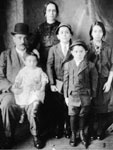Online Seminar: Choices in Little Rock
From the Facing History and Ourselves website:
"Facing History and Ourselves' newest online seminar, 'Choices in Little Rock,' is a rich and engaging exploration of the 1957 desegregation of Central High School in Little Rock, Arkansas. The seminar traces the legal and personal struggles of African Americans from Jim Crow America through the landmark supreme court decision on Brown v. Board of Education, and ultimately, to the courageous actions of nine young men and women determined to make desegregation a reality. Their efforts would lead to a crisis that historian Taylor Branch once described as 'the most severe test of the Constitution since the Civil War.'
This online seminar takes place over seven weeks. Each week, participants will engage in a variety of activities that will include reading materials, viewing video clips, creating journal entries, and participating in online facilitated discussion forums. Participants are expected to complete approximately four hours of work each week at their own pace.
Each participant will receive a copy of our teaching guide, Choices in Little Rock, as well as some additional resources, prior to the start of the seminar."

